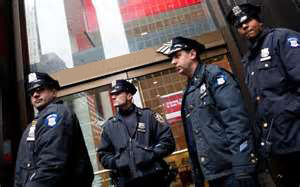The New York Times has recently published a report investigating the NYPD spying on Muslims.

The New York
Times has written that around 30 years ago the federal court imposed
limitations on the police investigation system with the aim of providing more
protection for law-abiding citizens.
The latest scandal surrounding the New York Police Department suggests that
the Big Apple’s boys in blue were targeting Muslims in undercover operations,
working outside of their jurisdiction and profiling ethnic communities with aid
from the CIA.
The NYPD are denying allegations reported by The Associated Press that the
Police Department has been sending undercover informants into mosques, minority
neighborhoods, hookah bars and other hangouts frequented by Muslims in order to
gather intel, despite having no probable cause to suspect crimes were being
hatched.
A federal judge overruled a law in 2002 that kept cops from waiting for
"specific information” before gathering intelligence, and ever since the NYPD
has used this to their advantage to infringe on the constitutional rights of
Muslims by spying on them in what is being suggested as an anti-terrorism
initiative.
Joseph
Goldstein’s New York Times article of February 3 outlines a request from US
civil rights lawyers to federal judge Charles S Haight Jr for an independent
evaluation of the New York Police Department’s counterterrorism techniques.
Writes
Goldstein: "The lawyers said the police’s tactics have placed Muslim
communities under surveillance in violation of longstanding federal court
guidelines.” Among these guidelines is a prohibition on the retention of
information collected during surveillance operations unless it pertains "to
potential unlawful or terrorist activity”.
As an
American news agency revealed in 2011, Muslim populations in the New York area
had been targeted by a pervasive spying apparatus known as the Demographic
Unit, the fruit of collaboration between the NYPD and the CIA.
The
network, which has since been promoted to the more politically correct title
"Zone Assessment Unit”, relies on undercover officers and informants to perform
critical national security tasks such as - the agency notes - "gathering
intelligence on cab drivers and food cart vendors, jobs often done by Muslims”.
Galati, the commanding officer of the NYPD Intelligence Division,
offered the first official look at the Demographics Unit, which the NYPD denied
ever existed when it was revealed by the AP last year. He described how police
gather information on people even when there is no evidence of wrongdoing,
simply because of their ethnicity and native language.
As a rule, Galati said, a business can be labeled a "location of
concern" whenever police can expect to find groups of Middle Easterners
there.
Galati testified as part of a lawsuit that began in 1971 over NYPD
spying on students, civil rights groups and suspected Communist sympathizers
during the 1950s and 1960s. The lawsuit, known as the Handschu case, resulted
in federal guidelines that prohibit the NYPD from collecting information about
political speech unless it is related to potential terrorism.
Civil rights lawyers believe the Demographics Unit violated those rules.
Documents obtained by the AP show the unit conducted operations outside its jurisdiction,
including in New Jersey. The FBI there said those operations damaged its
partnerships with Muslims and jeopardized national security.
In one instance discussed in the testimony, plainclothes NYPD officers
known as "rakers" overheard two Pakistani men complaining about
airport security policies that they believed unfairly singled out Muslims. They
bemoaned what they saw as the nation's anti-Muslim sentiment since the 2001
terrorist attacks.
Galati said police were allowed to collect that information because the
men spoke Urdu, a fact that could help police find potential terrorists in the
future.
Just last week, a Freedom of Information Act
request for a phone call placed with emergency services in New Brunswick, New
Jersey ended up with the recording being released to the Web, revealing that
law enforcement agents across the river from Manhattan were unaware that the
NYPD was leaving the Big Apple to do surveillance across the river. New York
Mayor Michael Bloomberg and NYPD Commission Ray Kelly have both defended the
police department’s actions.
Evidence are considered to be enough to raise
concerns about extrajudicial actions of the police. If claims turn out to hold
truth, it would be necessary that the judge will appoint an independent supervisory
unit for the investigation procedures in the police department.
